MSI Big Bang-XPower II X79 Review – A World of Novelty Heatsinks
by Ian Cutress on February 25, 2012 3:00 PM EST- Posted in
- Motherboards
- MSI
- X79
USB Speed
For this benchmark, we run CrystalDiskMark to determine the ideal sequential read and write speeds for the USB port using our 64GB Patriot SuperSpeed USB 3.0 drive. Then we transfer a set size of files from the SSD to the USB drive, and monitor the time taken to transfer. The files transferred are a 1.52 GB set of 2867 files across 320 folders – 95% of these files are small typical website files, and the rest (90% of the size) are the videos used in the Sorenson Squeeze test.
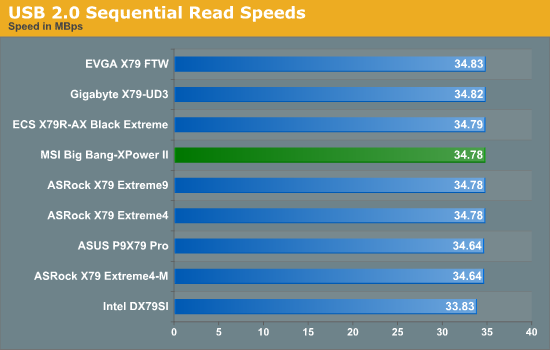
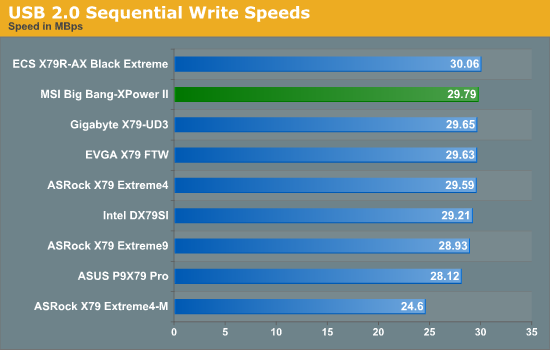
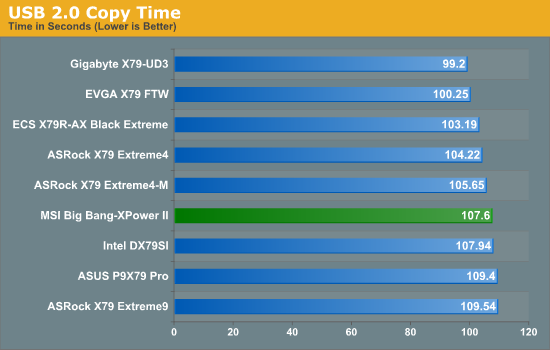
USB 2.0 performance is unfortunately nothing to shout about.
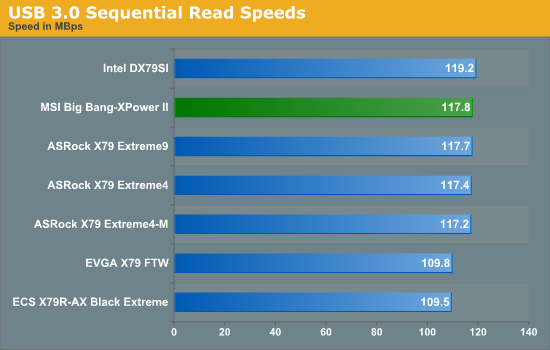

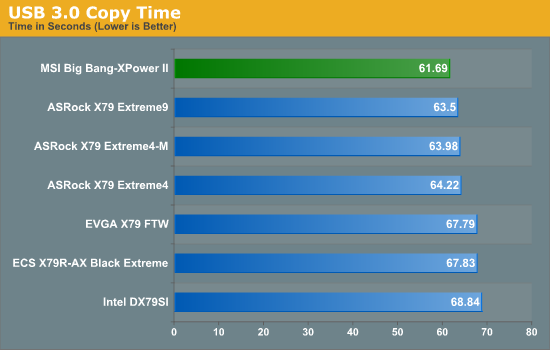
USB 3.0 performance however is the best BOT protocol performance we've seen (compared to ASRock's XFast and ASUS' USB Boost).
SATA Testing
We also use CrystalDiskMark for SATA port testing. The operating system is installed on the SSD, and the sequential test is run at the 5 x 1000 MB level. This test probes the efficiency of the data delivery system between the chipset and the drive, or in the case of additional SATA ports provided by a third party controller, the efficiency between the controller, the chipset and the drive.
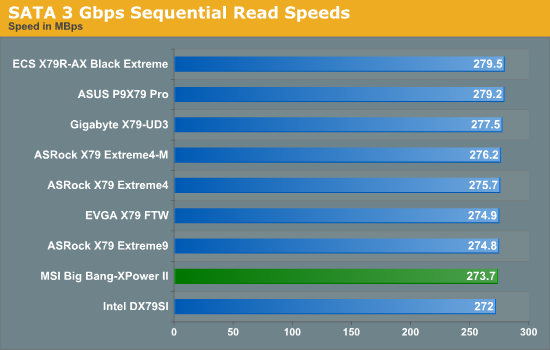
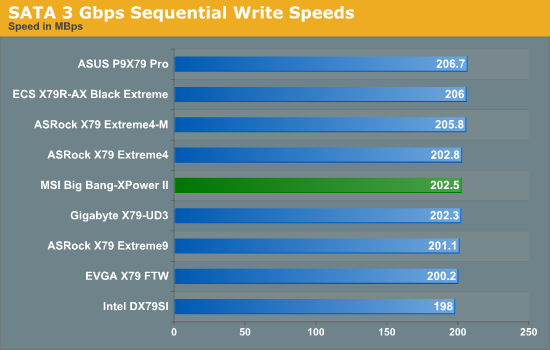
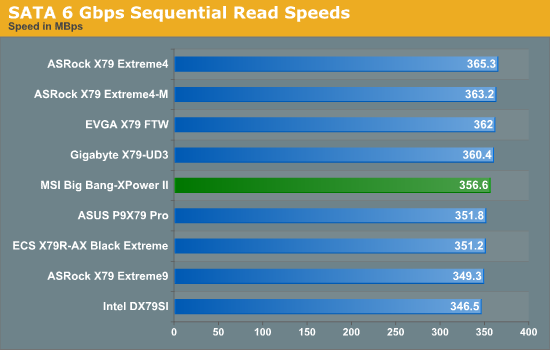
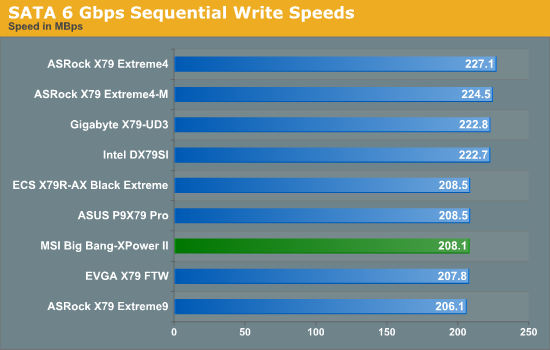
SATA performance seems nothing special when talking about sequential performance.
DPC Latency
Deferred Procedure Call latency is a way in which Windows handles interrupt servicing. In order to wait for a processor to acknowledge the request, the system will queue all interrupt requests by priority. Critical interrupts will be handled as soon as possible, whereas lesser priority requests, such as audio, will be further down the line. So if the audio device requires data, it will have to wait until the request is processed before the buffer is filled. If the device drivers of higher priority components in a system are poorly implemented, this can cause delays in request scheduling and process time, resulting in an empty audio buffer – this leads to characteristic audible pauses, pops and clicks. Having a bigger buffer and correctly implemented system drivers obviously helps in this regard. The DPC latency checker measures how much time is processing DPCs from driver invocation – the lower the value will result in better audio transfer at smaller buffer sizes. Results are measured in microseconds and taken as the peak latency while cycling through a series of short HD videos - under 500 microseconds usually gets the green light, but the lower the better.
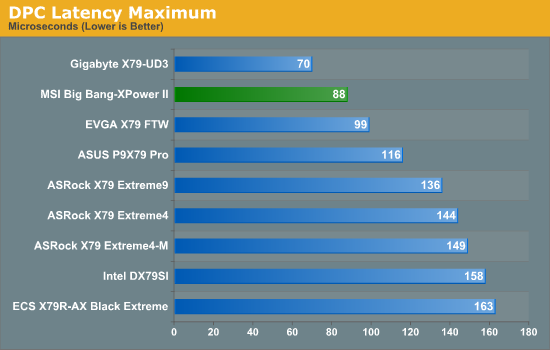
DPC performance is some of the best we've ever had, coming in at 88 microseconds.










45 Comments
View All Comments
Operandi - Sunday, February 26, 2012 - link
"Giant fag" might be going a bit far but unless MSI is aiming for the immature 14 year old who lives their life through MW or BF I think they missed the mark big time with the design. Which is too bad because I otherwise I like the murdered out all black aesthetic.As it is Asus, Gigabyte are both making great boards that don't look stupid so I can easily skip this and look elsewhere.
leignheart - Wednesday, May 16, 2012 - link
nah it would only scream that if you owned it Ben90bobeedee - Sunday, February 26, 2012 - link
got to agree with physical-leave the stupid toys off of the motherboard.Bownce - Tuesday, February 28, 2012 - link
I think they're great. They should also include bandoleers for overclocking, a tiny lever action for resetting, and a D.B. icon for when it crashes.Oxford Guy - Saturday, February 25, 2012 - link
Isn't that exciting! Wow!Guys! Maybe think about cooling it with the exclamation point! Most of the review blurbs on the main page have them!
Oxford Guy - Saturday, February 25, 2012 - link
Probably the best PSU ever! Like O-My-Gosh!http://www.anandtech.com/show/5464/seasonic-platin...
coolhardware - Saturday, February 25, 2012 - link
I like all the exclamation points!PS Thanks for all the reviews and content lately, it is nice to see AnandTech updated so often...
Iketh - Saturday, February 25, 2012 - link
This particle article I didn't care to read in its entirety, so I glanced through hoping to find the few pieces of information I wanted. One was the MSRP... it's always listed at the bottom of the spec list in every other review on this site. Why omit it here? Please adhere to some of these simple standards so that your articles are less taxing on the reader.IanCutress - Saturday, February 25, 2012 - link
There are no official standards in motherboard reviewing, so unless you provide a list of official 'simple standards' then there is nothing to do apart from consider your request/command to have it exactly where you specifically want information XYZ. The MSRP is listed in a number of places throughout the review (and is consistent with previous reviews) - a link through on the product to a retailer on the test bed, and the last page in particular. It wouldn't be a proper review if we didn't talk about the price! For the record, it is currently $390.All the best,
Ian
Iketh - Saturday, February 25, 2012 - link
Sure there is. The articles on this site follow a similar pattern regardless of what they're about. After not finding the price in the introduction, I knew to jump to the page that introduces the board to find the spec sheet. Unfortunately, the price was not listed at the bottom as it normally is.Of course you talked about the price, I just didn't want to read the full article to find it as I alluded to in my first post. It's a request based on what I'm used to at this site, not a command.
And by the way, there are very few articles I rarely read from beginning to end here. It's just the theme of this board is childish, like a cheap toy when it's anything but.